 |
 |
Can't view this email? Visit the newsletter in your browser.
|
| "A world where equity is at the root of a dynamic harmony between peoples and nature, as well as among peoples..." |

 |
|
Comments from the Chair: Aroha Te Pareake Mead
There are some areas of consensus, such as recognition that a more sustainable economy must be built on a strong and healthy natural resource base, and that broad participation of civil society in decision-making at all levels through access to information and public participation, is essential for sustainable development and good governance, but there remain many areas of disagreement. These include; the human right to clean water, the right of everyone to be free from hunger, the role of the Green economy in the context of poverty eradication and sustainable development and pretty much everything to do with any ‘rights’ that are not the rights of states to have full control of the resources within their national boundaries. As far as disagreements go, these are big ones and we can only hope that common sense and a shared global commitment to the dignity of peoples and respect for the integrity of nature will prevail, after all the ‘future we all want’ is too important to leave to others to decide for us.. |
 |
 |
|
CEESP NEWS Sustainable use of biodiversity is a critical area of work for IUCN for many reasons: to safeguard the resources underpinning community livelihoods; to promote equitable sharing of the benefits of use of biodiversity; to address widespread overexploitation; and as a tool to generate incentives for conservation. This new CEESP/SSC Specialist Group builds on the extensive previous work of the SSC’s Sustainable Use Specialist Group, and stems from a Resolution from the Barcelona WCC calling for cross-Commission collaboration on sustainable use. CEESP Inter-generational Youth Advisor, Catie Burlando, completes PhD Her thesis was on land use planning policy in the Far North Region of Ontario: Conservation targets, politics of scale, and the role of civil society organizations in Aboriginal-state relations. |
 |
 |
|
CEESP MEMBERS ACTIVITIES Grazia will be following ICCA’s and related issues, including holding the following workshop. Public Forum on Women, Mining and Human Rights in Latin America The public forum is sponsored by LAMMP (Latin American Mining Monitoring Programme) and the ULAM (Union of Latin American Women, Paul H. Nitze School of Advanced International Studies, Johns Hopkins University, Washington DC, May 11, 2012. CEESP member Alonzo Zarzycki to participate in the IUFRO Forests for People Conference in Austria CEESP member Alonzo Zarzycki is participating in the IUFRO Forests for People Conference in Austria, May 22-24, 2012, Mr Zarzycki will be presenting "Tourism Master Plan for the Natural Forests on Private Lands around El Rey National Park and Watershed -- Fundación Urundei collaboration with the rural residents, National University of Salta, National Park Service and the Provincial Government of Salta, Argentina " CEESP members to present workshop at the International Society of Ethnobiology Congress Panels & Side Event
Workshop Background Although much work focuses on agricultural systems within conventional food security research the role of biodiversity in supporting sustainable food systems has been neglected. In many rural areas biodiversity at the species level contributes to rural food systems in the form of food products; these food products are components of local trade and extra-local trade networks. Biodiversity, at the level of land/seascapes, also contributes to rural food systems. Landscape patchiness provides a range of ecosystem services from watershed protection to species that may only be used at certain times (seasons / hunger periods) or for specific reasons (medicines, housing materials). CEESP Youth Leadership Team (YLT) member Shalini Dhyani (India) attends Planet Under Pressure 2012 Her work on fodder bank establishment and development contributed the solutions of adapting and mitigating the impacts of climate change by adaptive co-management strategy. The lessons presented from her project (reducing pressure from forests by using fast growing and high biomass yielding indigenous species) in the conference indicated that climate change adaptation requires an integrated conservation and development programs together with focus on disaster risk reduction.
CEESP Chair Aroha Mead will be a keynote speaker at the International Indigenous Development Research Conference in Auckland, NZ, 27-30 June 2012. The conference will highlight indigeneity and the multidisciplinary approach used for indigenous development. The Conference will be following themes central to the realisation of indigenous development: - Optimising Indigenous Economic Wellbeing – addressing issues, needs and opportunities arising in Māori and indigenous communities leading to increased economic independence and self-determination. |
 |
 |
|
CEESP UPDATES & REPORTS The CEESP Annual Report for 2011 was tabled at the 78th IUCN Council Meeting in February 2012. A full copy of the Report can be located HERE. The Commission on Environmental, Economic and Social Policy (CEESP) has over 1000 members spread across all regions of the world. Managing Natural Resources For Post-Conflict Reintegration and Recovery At the end of February 2012, Mark van der Wal, a TECS member represented IUCN and TECS at a workshop on MANAGING NATURAL RESOURCES FOR POST-CONFLICT REINTEGRATION AND RECOVERY in Montreux, Switzerland. The meeting was organized jointly by the UNEP Post-Conflict and Disaster Management Branch (UNEP/PCDMB), the UNDP Bureau for Crisis Prevention and Recovery (UNDP/ BCPR), the Center for Stabilization and Reconstruction Studies (CSRS) and the Inter-Agency Working Group on Disarmament, Demobilization and Reintegration (IAWG). Update on Whakatane Mechanism
Since January 2011, the Whakatane Mechanism has been piloted in two places: at Mount Elgon in western Kenya and in Ob Luang National Park in northern Thailand. Discussions are underway now between IUCN, CEESP, FPP and indigenous peoples organisations to develop a framework for scaling out the Mechanism. Preparing for Congress: Strengthening intergenerational partnerships for sustainability within CEESP and across Commissions
Indigenous Women: key actors in poverty and hunger eradication "Indigenous Women: key actors in poverty and hunger eradication" (E/CN.6/2012/L.6). Just Conservation
One of the hardest aspects of conservation related conflicts is trying to sift through the contested representations and understandings of what has happened to whom, who is responsible for any wrong doing, and who is involved. Often information is limited, opaque or comes only after much delay. We often hear about fait accompli, not current struggles. The Do's and Don'ts of Supporting Forest Conservation and Restoration Initiatives by local communities and Indigenous Peoples The report is the result of a joint initiative by the REDD and Communities Task Force of the Theme on Governance, Equity and Rights of the IUCN Commission on Environmental, Economic and Social Policy (CEESP), the International Consortium on Territories and Areas Conserved by Indigenous Peoples and Local Communities (ICCAs) and the Global Forest Coalition to analyze appropriate incentive systems for ICCAs and other community initiatives to conserve and restore forests. Report on TILCEPA PoWPA Training Program
The workshop was held outside of Cape Town, South Africa. The governance presentations included an overview of Namibia’s experience with setting up a Community Conservancy network from the time of independence to present. Innovation for 21st Century Conservation: Science informing Policy in Australia Around 70 participants from different sectors of the conservation and NRM professional community gathered at this occasion. Many presentations and discussions were very relevant to CEESP including some good examples of land management practices by indigenous peoples, collaborative management approaches, etc. CEESP regional vice-chair for Oceania chaired a section on “Innovation in Governance”. The program and abstracts can be downloaded here. A publication from this workshop will be forthcoming.
“Cambio Climático impacta de manera diferenciada a mujeres y hombres.” Ambas expositoras invitaron a reflexionar sobre la toma de acción ante los hechos que se viven actualmente en el país y alrededor del mundo. Destacan la importancia de la inclusión de temáticas de género en las discusiones sobre el cambio climático y el desarrollo de políticas públicas. IUCN Panel to provide recommendations to help restore the Niger Delta |
 |
 |
|
Opportunities for Members Call for an Intergenerational IUCN-wide Logo
We plan to use the Task Force logo alongside the IUCN logo for all cross-Commission projects and next to relevant Commission logos for projects within the: CEC (Education and Communication) CEESP (Environment, Economic and Social Policy) CEL (Environmental Law) CEM (Ecosystems Management) SSC (Species Survival) WCPA (World Commission on Protected Areas).
|
 |
 |
 |
 |
 |
|
CEESP @ the WCC CEESP at the World Conservation Congress (WCC) It is shaping up to be an action-packed WCC for CEESP. If you are planning to attend the WCC please contact us at ceesp@iucn.org so we can involve you and keep you informed about CEESP related events during the Congress.
Here are some of the events already planned: As Commission members, you are all cordially invited to attend the CEESP general meeting on September 6th to be held at the WCC conference venue from 8:30-3pm. If you haven’t already registered for the WCC, remember that as a Commission member you are entitled to a discounted registration rate.
A Review of the Impact of IUCN Resolutions on International Conservation Efforts
IUCN Congress Programme now live
The Online Programme contains useful tools to help you sieve through the large number of events in an easy and intuitive way. You can decide to browse through the entire list of events or filter them by text search, session details, keyword or language. This will tell you all you need to know in terms of times, dates, venues and the types of sessions. Detailed information can be accessed by clicking on the titles of the events.
Candidates for IUCN Council 2013-2016 including CEESP
Aroha Mead, current Chair of CEESP is running uncontested for a second term as Chair of CEESP. Aroha's information can be found via the following link.
CEESP Mesoamérica prepara su camino para Knowledge café en Jeju
De acuerdo con Vivienne Solis, directora de la organización CoopeSoliDar R.L y vicepresidenta de la CEESP en la región, este taller abrió un espacio de análisis y discusión, que sirvió como proceso de consulta sobre las nuevas directrices de pesca artesanal responsable de la FAO a nivel regional.
|
 |
 |
|
PUBLICATIONS & RESOURCES
The eleven thematic areas (see below) should be seen as requisite for providing information required in forming programming and management decisions, although the proposed indicators framework should be considered flexible to allow for adaptation to take into account national or sub national circumstances.
Indigenous Resource Management Systems: A holistic approach to nature and livelihoods This article argues that indigenous resource management systems are not only well poised to reduce deforestation rates but also to provide a rich array of experiences, expertise, and practices that can significantly contribute to protecting biodiversity, food security, and sustainable livelihoods in indigenous communities, as well as finding answers to climate change challenges. The full article can be read via the link below. Climate Change, Human Security and Violent Conflict - Challenges for Societal Stability
Jürgen Scheffran • Michael Brzoska • Hans Günter Brauch (CEESP Member) • Peter Michael Link • Janpeter Schilling (Eds.): Climate Change, Human Security and Violent Conflict - Challenges for Societal Stability . Hexagon Series on Human and Environmental Security and Peace, vol. 8 (Heidelberg - Dordrecht - London - New York : Springer, 30 April 2012).
Animated video on climate change adaptation New Video - Adaptacion al Cambio Climatico: Gente y ecosistemas: Adapting to climate change: people and ecosystems The 4min video is narrated in Spanish with English subtitles: UN Guidelines on Isolated Indigenous Peoples The UN has published guidelines on Isolated Indigenous Peoples in Paraguay, Amazon & Gran Chaco. It is directed to the Amazon region (9 countries including Peru, Ecuador, Colombia, Brasil, etc), and the Gran Chaco region of Bolivia, Argentina,Paraguay (and small part of Brazil), and Eastern Paraguay (largely Atlantic Forest and wetlands).
The Law of Self-Determination and the United Nations Declaration on the Rights of Indigenous Peoples The article is based on the author’s personal observations and notes of the debates over the course of thirty years as well as the written records of the drafting and debate of the Declaration. The Right to Decide: New Report Highlights Why Companies Need to Operate with Free, Prior and Informed Consent of Indigenous Peoples San Francisco, CA – Industrial resource extraction is posing grave threats to the survival of indigenous peoples in the Amazon Basin and there are serious moral, legal and financial reasons for corporations to stem the tide of abuse and respect indigenous peoples' rights, Amazon Watch said in a briefing paper released today. The paper, entitled The Right to Decide: The Importance of Respecting Free, Prior and Informed Consent (FPIC), makes the strong case that respecting indigenous peoples' rights is not just a moral imperative, but also a business necessity for corporations to avoid financial risk, reputational damage, divestment campaigns, operational delays due to social unrest, multi-billion dollar legal liabilities, and loss of license to operate. A Case Study Approach to Demonstrate the Use of Assessment and Monitoring as Tools for Participatory Environmental Governance This study demonstrated scenarios for such governance from three agro-ecological zones in different geographical, biophysical and socio-cultural settings: (i) Kedarnath Wildlife Sanctuary in the temperate forests of the Central Himalayas, (ii) Kolleru Lake, a freshwater lake in the Krishna Basin and (iii) the downstream Ganges seasonal floodplains in Bangladesh. The cross-disciplinary set of approaches in these examples involves the use of spatial tools and socioeconomic surveys to build a scenario-based framework with cross-scaling prospects. High level policy dialogue between the Alliance for a Green Revolution in Africa (AGRA) and small scale farmers on the priorities and governance of agricultural research for development in West Africa This photo story highlights key moments in a policy dialogue on agricultural research for development that involved small scale farmers and representatives of the Alliance for a Green Revolution in Africa (AGRA). Over one hundred people participated in this unprecedented policy dialogue which was chaired by the UN SPecial Rapporteur on the Right to Food, - on 1st to 3rd February 2012 in Accra (Ghana) Ghana policy dialogue between AGRA and small scale farmers The International Institute for Environment and Development have now published their conclusions from the high-level policy dialogue between the Alliance for Green Revolution in Africa (AGRA) and small scale famers on the priorities and governance of agricultural research for development in West Africa, which the All-Party Parliamentary Group on Agroecology helped facilitate in February 2012. Souveraineté alimentaire et systèmes alimentaires autonomes Integrated REDD+ Assessment of Peru Though the rules for a REDD+ global mechanism are still under development, and the international market for carbon is plagued by uncertainty, governments, domestic and international nongovernmental organizations (NGOs) and private sector actors are engaged in policy preparation and pilot activities. Peru is on the cutting edge of REDD+ in comparison to most countries in the world. Peru’s 72 million-hectare forest estate has the potential to contribute to meeting international REDD+ objectives, as well as conserve biodiversity. Léxico Financiero y de Mercados de Carbono Para poner en práctica esta estrategia de manera eficiente es necesario lograr una comunicación efectiva entre las agencias del gobierno y las instituciones de los sectores públicos y privados por medio de vocabulario, acrónimos, definiciones y descripciones claras y fáciles de entender. FOREST PEOPLES: Numbers across the world A peoples who primarily depend on forests for their livelihoods, and to enhance their visibility as key actors and rights-holders in the management and use of forests and forest resources. CEC Chair co-authors UN report on Food and Agriculture: The Future of Sustainability Exposing unforeseen areas of consensus - with contributions from more than 70 global agri-food leaders in the business, policy, green, and social arenas - the report lays out concrete steps for sustainable and resilient food and agriculture systems. Biocultural Community Protocols: A Toolkit for Community Facilitators (Natural Justice) Community Futures, Legal Architecture: Foundations for Indigenous Peoples in the Global Mining Boom Where the imposition of statutory regulation is likely to result in conflict with local people, some large modern corporations have shown a preference for alternatives to repressive measures and expensive litigation. Ensuring that local people benefit economically is now a core goal for those companies that seek a social licence to operate to secure these resources. International land deals: who is investing and where - get the data But reliable data has been hard to find. Now, an international coalition of NGOs and research groups has published the world's largest database of deals struck since 2000, offering unprecedented detail on who's investing, where and what for. The database, launched on Thursday, includes 1,006 deals covering 70.2m hectares (173m acres) - or roughly half the size of western Europe. Data on further deals will be added on an ongoing basis. Linking Poverty Alleviation to Ecosystem Service Payments in Asia Pacific The Foundation for Development Cooperation produced the following Discussion Paper in March 2012 “Linking Poverty Alleviation to Ecosystem Service Payments in Asia Pacific: A Call to Action”. The Discussion Paper is co-authored by the Foundation for Development Cooperation and Conservation International. |
 |

IUCN Newsletters
New video available about IUCN in English, French and Spanish
A new IUCN video is now available on YouTube.
IUCN SCC Bulletin |
CEC Newsletter
|
CEM Newsletter |
CEL Newsletter |
WCPA Newsletter |
Business & Biodiversity Newsletter |
IUCN Off the Shelf |
|

| "A world where cultural diversity is intertwined with biological diversity and both generate abundant livelihoods opportunities." |
Commission on Environmental, |

 In a few weeks, over 120 heads of State and 50,000+ people will be gathering in Rio de Janeiro for Rio+20, the 20th anniversary of the UN Conference on Sustainable Development (UNCED), also known as the Earth Summit. A document entitled ‘The Future We Want’ is to become the main political output of Rio+20 and negotiations have been ongoing.
In a few weeks, over 120 heads of State and 50,000+ people will be gathering in Rio de Janeiro for Rio+20, the 20th anniversary of the UN Conference on Sustainable Development (UNCED), also known as the Earth Summit. A document entitled ‘The Future We Want’ is to become the main political output of Rio+20 and negotiations have been ongoing. 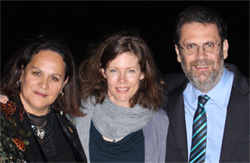 In recent months a new collaboration between CEESP and the Species Survival Commission has been taking shape. The SULi Specialist Group is a cross-Commissional Specialist Group focused on the sustainable use of wild living resources. CEESP members with expertise and experience on this issue are warmly invited to get in touch and engage in this.
In recent months a new collaboration between CEESP and the Species Survival Commission has been taking shape. The SULi Specialist Group is a cross-Commissional Specialist Group focused on the sustainable use of wild living resources. CEESP members with expertise and experience on this issue are warmly invited to get in touch and engage in this.
 CEESP Inter-generational Youth Advisor, Catie Burlando, completed her PhD thesis this year.
CEESP Inter-generational Youth Advisor, Catie Burlando, completed her PhD thesis this year.  CEESP members Vivienne Solis-Rivera and Grazia-Borrini-Feyerabend are holding a series of events during the upcoming Rio 2012 Summit at the Cupola do Povos. Vivienne is dealing with issues related to the Women’s Major Group, TAI ( the issue of access to participation, justice and information concerning Principle 10) and issues related to marine conservation and small scale fisheries within the Peasant Major Group.
CEESP members Vivienne Solis-Rivera and Grazia-Borrini-Feyerabend are holding a series of events during the upcoming Rio 2012 Summit at the Cupola do Povos. Vivienne is dealing with issues related to the Women’s Major Group, TAI ( the issue of access to participation, justice and information concerning Principle 10) and issues related to marine conservation and small scale fisheries within the Peasant Major Group. 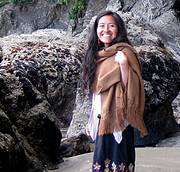 Co-Chair of TGER Juanita Cabrera-Lopez is an organizer of "Public Forum on Women, Mining and Human Rights in Latin America".
Co-Chair of TGER Juanita Cabrera-Lopez is an organizer of "Public Forum on Women, Mining and Human Rights in Latin America".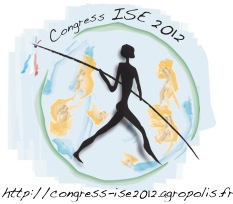



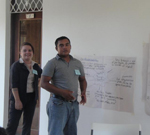 The CEESP Youth Leadership Team is involved in a number of exciting events that will take place at the World Conservation Congress this coming September. The CEESP Youth Network now has a link in the IUCN page that will be used together with the wikispace to keep you posted on these and other events being planned in the coming months.
Our group is happy to support CEESP-TGER member Caroline Seagle, a young professional that was able to secure the nominations needed to run in the September elections as a Regional Councillor for North America and the Caribbean . Caroline is a PhD candidate in anthropology with a joint appointment at the VU University Amsterdam and McGill University.
The CEESP Youth Leadership Team is involved in a number of exciting events that will take place at the World Conservation Congress this coming September. The CEESP Youth Network now has a link in the IUCN page that will be used together with the wikispace to keep you posted on these and other events being planned in the coming months.
Our group is happy to support CEESP-TGER member Caroline Seagle, a young professional that was able to secure the nominations needed to run in the September elections as a Regional Councillor for North America and the Caribbean . Caroline is a PhD candidate in anthropology with a joint appointment at the VU University Amsterdam and McGill University.  The Commission on the Status of Women at its Fifty-sixth Session, adopted a resolution:
The Commission on the Status of Women at its Fifty-sixth Session, adopted a resolution: JUST CONSERVATION - With a view to broadening the debate about conservation related conflicts and their links to NGO accountability, the Just Conservation network was launched in 2010; first on Facebook, in both English and Spanish, and now with its own independent web site at
JUST CONSERVATION - With a view to broadening the debate about conservation related conflicts and their links to NGO accountability, the Just Conservation network was launched in 2010; first on Facebook, in both English and Spanish, and now with its own independent web site at 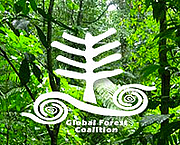 The final version of the report on "the Do's and Don'ts of Supporting Forest Conservation and Restoration Initiatives by local communities and Indigenous Peoples", was launched at a side event at the CBD SBSTTA meeting in Montreal (3 May 2012).
The final version of the report on "the Do's and Don'ts of Supporting Forest Conservation and Restoration Initiatives by local communities and Indigenous Peoples", was launched at a side event at the CBD SBSTTA meeting in Montreal (3 May 2012).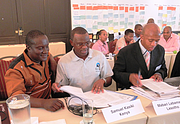 Drs Margaret Jacobsohn (Namibia) and Nigel Crawhall (South Africa) of the WCPA-CEESP inter-Commission Theme on Indigenous Peoples, Local Communities, Equity and Protected Areas (TILCEPA) ran a half-day session on governance of Protected Areas at the CBD capacity building workshop on the Programme of Work for Protected Areas for Central, East and Southern Africa, 30 January – 3 February 2012.
Drs Margaret Jacobsohn (Namibia) and Nigel Crawhall (South Africa) of the WCPA-CEESP inter-Commission Theme on Indigenous Peoples, Local Communities, Equity and Protected Areas (TILCEPA) ran a half-day session on governance of Protected Areas at the CBD capacity building workshop on the Programme of Work for Protected Areas for Central, East and Southern Africa, 30 January – 3 February 2012. 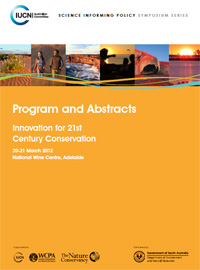 The Australian Committee of IUCN with partners organized a workshop in March 2012 to discuss several topics related to Innovation in Conservation.
The Australian Committee of IUCN with partners organized a workshop in March 2012 to discuss several topics related to Innovation in Conservation.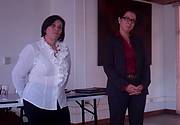 En el marco de la Celebración del Día Internacional de la Mujer, el pasado 8 de marzo, las expositoras Msc. Lorena Aguilar, Consejera de la Unidad de Género y Ambiente de UICN y Msc. Vivienne Solís, vicepresidenta de la Comisión de Educación y Comunicación CEESP de la UICN, discutieron acerca del impacto diferenciado que sufren las mujeres en condiciones de vulnerabilidad ante los embates del cambio climático.
En el marco de la Celebración del Día Internacional de la Mujer, el pasado 8 de marzo, las expositoras Msc. Lorena Aguilar, Consejera de la Unidad de Género y Ambiente de UICN y Msc. Vivienne Solís, vicepresidenta de la Comisión de Educación y Comunicación CEESP de la UICN, discutieron acerca del impacto diferenciado que sufren las mujeres en condiciones de vulnerabilidad ante los embates del cambio climático.
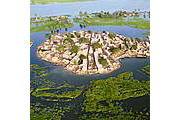 IUCN has recently established an Independent Advisory Panel that will provide scientific recommendations to the Shell Petroleum Development Company of Nigeria Ltd (SPDC), to help restore the biodiversity of its oil spill sites in the Niger Delta.
The panel will gather leading international and local experts that will collect ecological information related to the sites that have been affected by oil spills. It will then make recommendations on how to improve existing company standards to recover these sites. It will also encourage the involvement of local communities and civil society groups in its activities.
IUCN has recently established an Independent Advisory Panel that will provide scientific recommendations to the Shell Petroleum Development Company of Nigeria Ltd (SPDC), to help restore the biodiversity of its oil spill sites in the Niger Delta.
The panel will gather leading international and local experts that will collect ecological information related to the sites that have been affected by oil spills. It will then make recommendations on how to improve existing company standards to recover these sites. It will also encourage the involvement of local communities and civil society groups in its activities. Design a winning logo to be used globally by the IUCN Task Force on Intergenerational Partnership for Sustainability.
The Task Force invites you to design a logo that represents youth engagement and intergenerational partnership acting to bring about the IUCN vision of “a just world that values and conserves nature.”
Design a winning logo to be used globally by the IUCN Task Force on Intergenerational Partnership for Sustainability.
The Task Force invites you to design a logo that represents youth engagement and intergenerational partnership acting to bring about the IUCN vision of “a just world that values and conserves nature.”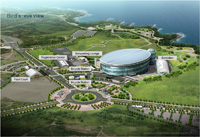
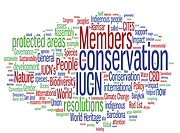 IUCN has just released a new publication “A Review of the Impact of IUCN Resolutions on International Conservation Efforts”. The main intention of this document is to give to the general public an overview of the importance of the IUCN World Conservation Congresses and General Assemblies, highlighting some of the major impacts and influences that Congress Resolutions have had on conservation.
IUCN has just released a new publication “A Review of the Impact of IUCN Resolutions on International Conservation Efforts”. The main intention of this document is to give to the general public an overview of the importance of the IUCN World Conservation Congresses and General Assemblies, highlighting some of the major impacts and influences that Congress Resolutions have had on conservation.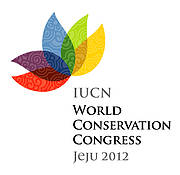 As the World Conservation Congress draws closer, you can now view what’s on and when. Regularly updated, the Online Programme is a handy companion to organize your schedule in Jeju and make the most out of your experience.
As the World Conservation Congress draws closer, you can now view what’s on and when. Regularly updated, the Online Programme is a handy companion to organize your schedule in Jeju and make the most out of your experience. Information about the candidates for the 49 positions of IUCN President, Treasurer, Chairs of IUCN Commissions and Regional Councillors to be elected during the 2012 World Conservation Congress in September 2012 can be found on the IUCN Congress website.
Information about the candidates for the 49 positions of IUCN President, Treasurer, Chairs of IUCN Commissions and Regional Councillors to be elected during the 2012 World Conservation Congress in September 2012 can be found on the IUCN Congress website. A finales de febrero se realizó un taller con organizaciones de jóvenes pescadores artesanales, el cual obtuvo valiosos resultados y aportes que enriquecerán el “Knowledge café”, que está preparando la CEESP Mesoamérica, junto con la Oficina Regional y la organización miembro CODDEFFAGOLF, de Honduras; la cual será presentada en setiembre próximo, durante la celebración del Próximo Congreso Mundial de la Conservación.
A finales de febrero se realizó un taller con organizaciones de jóvenes pescadores artesanales, el cual obtuvo valiosos resultados y aportes que enriquecerán el “Knowledge café”, que está preparando la CEESP Mesoamérica, junto con la Oficina Regional y la organización miembro CODDEFFAGOLF, de Honduras; la cual será presentada en setiembre próximo, durante la celebración del Próximo Congreso Mundial de la Conservación.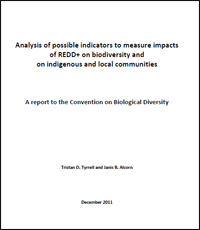
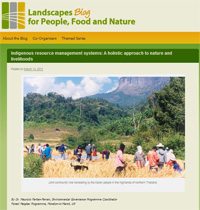 The following article, by Maurizio Farhan-Ferrari, Coordinator of FPP's Environmental Governance Programme, and CEESP Member, was recently published on the Landscapes Blog for People, Food and Nature.
The following article, by Maurizio Farhan-Ferrari, Coordinator of FPP's Environmental Governance Programme, and CEESP Member, was recently published on the Landscapes Blog for People, Food and Nature.
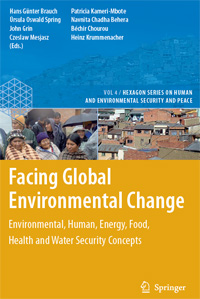 A major peer-reviewed scientific handbook on Climate Change, Human Security and Violent Conflict - Challenges for Societal Stability of more than 900 pages by Springer was written by 61 authors from 21 countries in Europe, Asia, Africa, North and Latin America and edited by
the following:
A major peer-reviewed scientific handbook on Climate Change, Human Security and Violent Conflict - Challenges for Societal Stability of more than 900 pages by Springer was written by 61 authors from 21 countries in Europe, Asia, Africa, North and Latin America and edited by
the following: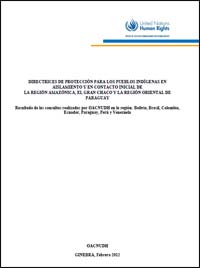 DIRECTRICES DE PROTECCIÓN PARA LOS PUEBLOS INDÍGENAS EN AISLAMIENTO Y EN CONTACTO INICIAL DE LA REGIÓN AMAZÓNICA, EL GRAN CHACO Y LA REGIÓN ORIENTAL DE PARAGUAY
DIRECTRICES DE PROTECCIÓN PARA LOS PUEBLOS INDÍGENAS EN AISLAMIENTO Y EN CONTACTO INICIAL DE LA REGIÓN AMAZÓNICA, EL GRAN CHACO Y LA REGIÓN ORIENTAL DE PARAGUAY
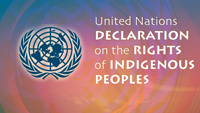 This article summarizes the international law concerning the right of self-determination at the time the Declaration was adopted and discusses the development and content of that right in the Declaration.
This article summarizes the international law concerning the right of self-determination at the time the Declaration was adopted and discusses the development and content of that right in the Declaration.
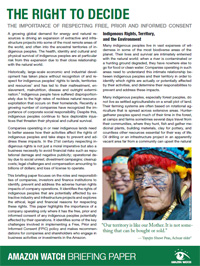 Amazon Watch Builds Case for FPIC and Gives Recommendations to Investors
Amazon Watch Builds Case for FPIC and Gives Recommendations to Investors
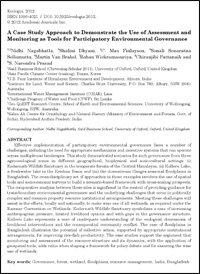 Effective implementation of participatory environmental governance faces a number of challenges, including the need for appropriate mechanisms and incentive systems that can operate across multiple-use landscapes.
Effective implementation of participatory environmental governance faces a number of challenges, including the need for appropriate mechanisms and incentive systems that can operate across multiple-use landscapes.
 A photo story on the High level policy dialogue between the Alliance for a Green Revolution in Africa (AGRA) and small scale farmers on the priorities and governance of agricultural research for development in West Africa.
A photo story on the High level policy dialogue between the Alliance for a Green Revolution in Africa (AGRA) and small scale farmers on the priorities and governance of agricultural research for development in West Africa. A report on the Ghana policy dialogue between AGRA and small scale farmers posted on the web site of the UK All Party Parliamentary Group (APPG) on Agroecology is now available.
See in particular their update of the policy dialogue in Ghana and the three video clips (towards bottom of page, Update of 16/04/12).
A report on the Ghana policy dialogue between AGRA and small scale farmers posted on the web site of the UK All Party Parliamentary Group (APPG) on Agroecology is now available.
See in particular their update of the policy dialogue in Ghana and the three video clips (towards bottom of page, Update of 16/04/12).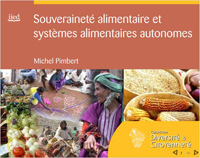 La société civile, les peuples indigènes et les nouveaux mouvements sociaux sont à l’origine d’un paradigme émergent sur la souveraineté alimentaire – les universitaires et les pôles de réflexion sur les politiques n’y apportant que des contributions de second ordre.
Au cœur de ce modèle de politique alternative pour l’agriculture et l’alimentation se trouve un objectif majeur: garantir et protéger les espaces, la capacité et le droit des personnes à choisir leurs propres modèles de production, de distribution et de modes de consommation alimentaire.
La société civile, les peuples indigènes et les nouveaux mouvements sociaux sont à l’origine d’un paradigme émergent sur la souveraineté alimentaire – les universitaires et les pôles de réflexion sur les politiques n’y apportant que des contributions de second ordre.
Au cœur de ce modèle de politique alternative pour l’agriculture et l’alimentation se trouve un objectif majeur: garantir et protéger les espaces, la capacité et le droit des personnes à choisir leurs propres modèles de production, de distribution et de modes de consommation alimentaire. 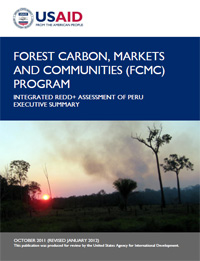 The UN Framework Convention on Climate Change (UNFCCC) and various voluntary carbon offset mechanisms have catalyzed global interest in the use of forests to meet climate change mitigation objectives through REDD+.1
The UN Framework Convention on Climate Change (UNFCCC) and various voluntary carbon offset mechanisms have catalyzed global interest in the use of forests to meet climate change mitigation objectives through REDD+.1 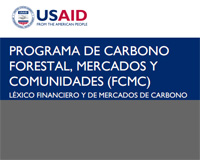 La agencia norteamericana para el desarrollo internacional USAID (United States Agency for International
Development) está dirigiendo al Gobierno de los Estados Unidos en la implementación de su programa de
elecciones estratégicas y esfuerzos para retener carbono en bosques y áreas forestales, y promover los beneficios socio-económicos y la biodiversidad (Strategic Choices for United States Fast Start Financing for REDD+)1.
La agencia norteamericana para el desarrollo internacional USAID (United States Agency for International
Development) está dirigiendo al Gobierno de los Estados Unidos en la implementación de su programa de
elecciones estratégicas y esfuerzos para retener carbono en bosques y áreas forestales, y promover los beneficios socio-económicos y la biodiversidad (Strategic Choices for United States Fast Start Financing for REDD+)1.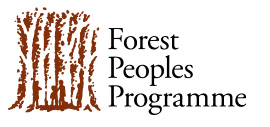 By providing estimated figures for indigenous and forest peoples’ populations in countries and regions across the globe, this new Forest Peoples Programme report seeks to raise awareness of the existence of peoples.
By providing estimated figures for indigenous and forest peoples’ populations in countries and regions across the globe, this new Forest Peoples Programme report seeks to raise awareness of the existence of peoples. 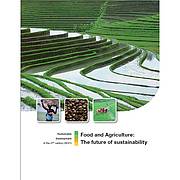 Keith Wheeler is co-author of this new report just released by the U.N. Division for Sustainable Development as a strategic input to the "Sustainable Development in the 21st Century Report" to be launched at the Rio+20 Summit.
On our current trajectory, severe disruptions to national and regional food systems are highly likely to happen - the main question is when.
Keith Wheeler is co-author of this new report just released by the U.N. Division for Sustainable Development as a strategic input to the "Sustainable Development in the 21st Century Report" to be launched at the Rio+20 Summit.
On our current trajectory, severe disruptions to national and regional food systems are highly likely to happen - the main question is when.
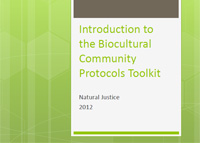 Biocultural community protocols can serve as a platform for communities to engage with external actors such as government agencies, researchers, NGOs, and the private sector according to their own terms, plans, priorities, and rights and responsibilities.
Articulating identity and ways of life, systems of stewardship, customary values and laws, and procedures for engagement can catalyze constructive dialogue and collaboration in locally appropriate ways. The process of documenting, developing, and using a biocultural community protocol can involve a number of participatory approaches.
Biocultural community protocols can serve as a platform for communities to engage with external actors such as government agencies, researchers, NGOs, and the private sector according to their own terms, plans, priorities, and rights and responsibilities.
Articulating identity and ways of life, systems of stewardship, customary values and laws, and procedures for engagement can catalyze constructive dialogue and collaboration in locally appropriate ways. The process of documenting, developing, and using a biocultural community protocol can involve a number of participatory approaches. 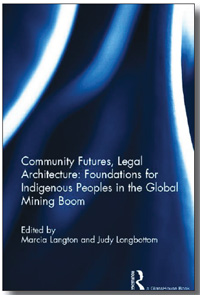 How are indigenous and local people faring in their dealings with mining and related industries in the first part of the 21st century? The unifying experience in all the resource-rich states covered in the book is the social and economic disadvantage experienced by indigenous peoples and local communities, paradoxically surrounded by wealth-producing projects. Another critical commonality is the role of law.
How are indigenous and local people faring in their dealings with mining and related industries in the first part of the 21st century? The unifying experience in all the resource-rich states covered in the book is the social and economic disadvantage experienced by indigenous peoples and local communities, paradoxically surrounded by wealth-producing projects. Another critical commonality is the role of law.
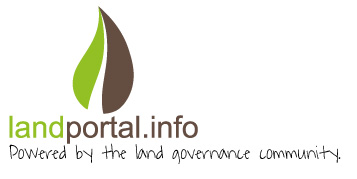 Over the past few years, so-called "land grabs" have become an increasingly hot topic.
Over the past few years, so-called "land grabs" have become an increasingly hot topic. 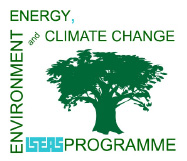 “Linking Poverty Alleviation to Ecosystem Service Payments in Asia Pacific: A Call to Action”.
“Linking Poverty Alleviation to Ecosystem Service Payments in Asia Pacific: A Call to Action”. 





